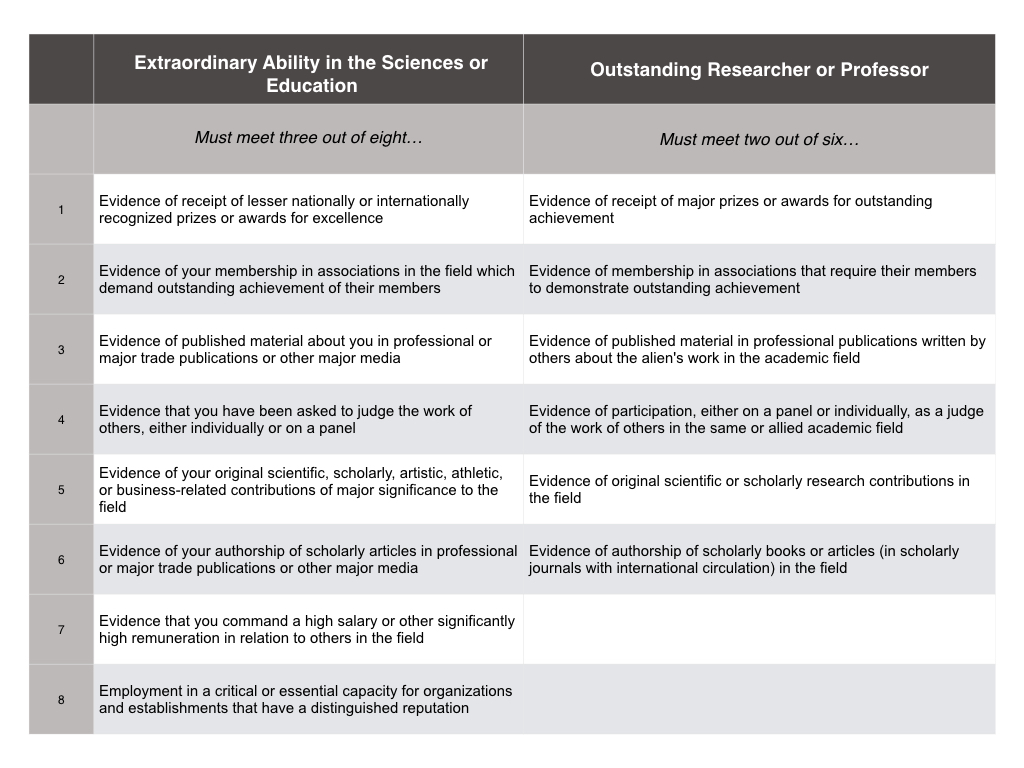Part One: Outstanding Scientists and Researchers
Each year, thousands of scientists and educators at the top of their field come to the United States to bring unique skills and qualifications to the U.S. workforce. Often, their employers offer them sponsorship for permanent residency, otherwise known as the green card. This can seem like a terrific prospect, particularly for those who have families or urgent travel needs. With a green card, the threat of being stopped at the border for visa renewals or administrative processing goes away, as well as the worry about losing the U.S. job and being out of work. Spouses can apply too, and are granted work authorization, which lets them continue their careers and contribute to both their families and the U.S. economy. Their children, many of whom have gone to school in the U.S. for years, are allowed to go to state colleges without having to pay out-of-state tuition when they become lawful permanent residents.
However, as most people in the midst of the process know, getting a green card is always easier said than done. Usually, when someone comes to the U.S. with employer sponsorship, they don’t get to choose their own immigration attorney. They’re stuck with whomever their employer has contracted to perform immigration legal matters for the entire corporation. Large companies often hire large law immigration firms, and individuals frequently have to fight to be heard, making the process slow and de-personalized.
This is especially troubling since Congress limits how many green cards will be issued to immigrants in a fiscal year. Employment-based immigration is currently capped 140,000 approvals, and no more than 7% of these can be allocated to natives of any one independent country within the FY. So, even though countries like India and China currently have waiting lists of 30,281 and 22,114 employment-based applications, no more than 9,800 will be approved in any given year.
It may seem like all hope is lost, but is it?
Absolutely not.
As the prominent psychologist Albert Bandura once said, “People who believe they have the power to exercise some measure of control over their lives are healthier, more effective and more successful than those who lack faith in their ability to effect changes in their lives.”
So what options do you have to speed up the process of getting your green card?
The first thing to know is that getting placed in a first employment-based preference category means you have higher odds of getting a green card sooner, as the U.S. economy deems people who fall into this categories as being in higher demand.
Many individuals working in the sciences or education might have been told they qualify for permanent residency as an Outstanding Researcher, also known as an EB-1(b). The difficulty with this type of petition is that it requires sponsorship from the employer, and it can take quite a long time for your company’s immigration law firm to put together the application. However, individuals who would qualify for as an Outstanding Professor or Researcher might also qualify for a different type of permanent residency that doesn’t require employer sponsorship:
The Extraordinary Ability in Sciences or Education
Extraordinary ability means just that – you can prove to the U.S. government that you have an ability in your field of study far above your peers. The criteria are similar to Outstanding Researchers or Professors, but with a few notable differences:
As you can see, the Outstanding Researcher or Professor requires two criteria out of six be met, whereas the Extraordinary Ability in the Sciences or Education requires three out of eight. However, this does not mean that it is easier to obtain classification in the former category than the latter.
Since only two out of six criteria need to be met, Outstanding Researcher or Professor petitions become heavily scrutinized under something called the Kazarian test, which establishes a legal precedent for the case’s approval or denial to be made based on the adjudicating officer’s final merits determination. In other words, simply presenting scholarly articles and claiming they are original contributions won’t be enough. A variety of evidence establishing you as being above your peers must be shown.
The Extraordinary Ability category is also subject to the Kazarian test. However, meeting additional criteria such as commanding a high salary compared to the national average and being employed in a critical or essential capacity means that the overall odds of being able to meet the three necessary criteria go up. Because of this, individuals who would normally qualify as Outstanding Researchers or Professors often have a good chance of success with an Extraordinary Ability petition, contrary to popular belief.
The Extraordinary Ability classification is a first preference-based category. When approved, qualifying individuals have a priority date that becomes current in accordance with the visa bulletin, allowing individuals from backlogged countries such as India, China, and the Philippines to obtain a green card sooner.

